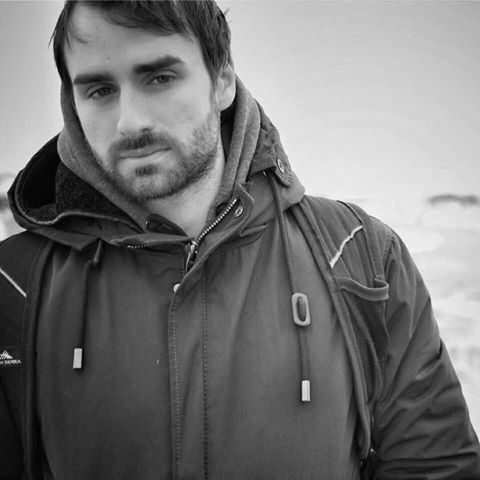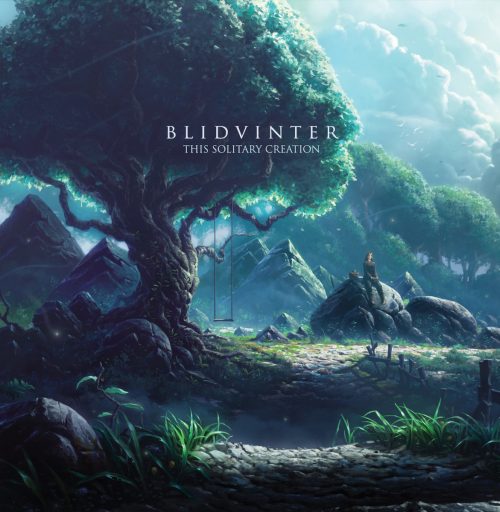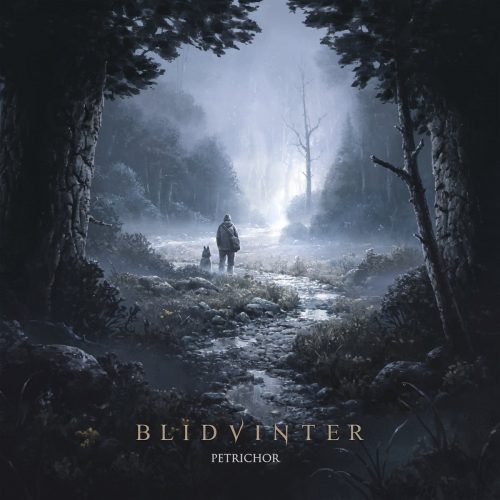
(It is rare to read an interview that’s so endearing in its candor and humility as this one, brought to us by Comrade Aleks, with Joakim Lundbäck, the Swedish man behind the band Blidvinter, whose debut album Petrichor was released this past March.)
Blidvinter is a solo project of Joakim Lundbäck who chose to work in the direction of mixing progressive death and melodic doom metal. The EP This Solitary Creation (2015) turned out to be a good teaser to the debut full-length Petrichor, released only a month ago.
Joakim’s material is multilayered and rich with a wide range of moods, from temporary melancholy to blind fury, and this storm of emotions is clad in tight, dynamic sound. Petrichor offers you a 50-minute journey in this dark realm of Joakim Lundbäck, so why not to talk with its author about the things we meet on our way?
Hi Joakim! How are you? How does the quarantine go?
Hey! I’m great! I’m enjoying my weekend off work. Daily weather is mostly cloudy today but spring is definitely coming along fast and I’m loving every bit of it.
I’m a pretty introverted/ambivert person in general so my daily life doesn’t really feel like it’s being turned upside-down by the quarantine. The Swedish government is not exactly pulling tight on the quarantine measures either, as some other countries do. I think their idea is for people to engage in social distancing but giving people responsibilities for themselves, and hoping that herd immunity will eventually give the virus a hard time finding hosts. I still go to the gym and to work pretty much as usual.
Blidvinter’s Facebook profile isn’t that informative. Don’t you feel a need to communicate with the project’s followers or just to share news more often?
Social media communications might not be my strong suit. I’m very easy to get in touch with here and will do my best to reply to any messages I get. Some people are really sweet and they send nice words in private messages and I always take time to reply to them. So it’s not a matter of that I don’t give a shit, but I’m genuinely not that great with updating social media, and some of it you might not see (as it is in the form of private messages.)
I don’t really feel the need to spew out a lot of non-music related updates. I had some ideas to share some behind the scenes work in the future, or at least status update during the production process. I didn’t really catch a whole lot of behind-the-scenes stuff for this album. There are only a few short sequences of me recording and it’s not really that informative, but I might share them somewhere down the line as a cool thing. I think it’s mostly during vocal recording when I’m screaming my ass off or pictures of my recording setup.

There’s little known about your solo project Blidvinter. Its first release is the EP This Solitary Creation (2015). Was Blidvinter born back then at this period, or earlier?
You could say it was born with the EP release. I had a lot of different weird project names for it but ended up on Blidvinter.
Why did you consider it most suitable?
I think I just went through a lot of English names that I felt were really cliché and basic and I felt the Swedish name of Blidvinter just stuck in the end. A flare of exoticism. Swedish, the exotic language (haha). I also felt that Blidvinter had a semblance of ‘meaning’ behind it, like you could potentially explain it if you wanted to, and it kind of makes sense in the context of the music. But it’s mostly just a name that I thought was cool and suited the Scandinavian vibe.
This three-song-long recording tends rather towards an atmospheric and melodic death sound with a few doom-death inserts. Which bands influenced Blidvinter during the creation of this material? How much of Opeth is in Blidvinter’s core?
There was a lot at the time but very little Opeth, if any at all. Although I enjoy some of their songs a lot, I haven’t listened that much to them in the past. The Opeth:y inspiration comes 99% from In Mourning, which was a heavy, heavy inspiration, particularly for the first EP. Then there was a lot of other inspiration here and there, sometimes not even from the metal genre itself.
I find that this is how a lot of projects start, and then they go on the path to mold their own original sound as time goes on and they mature. I feel that the move from This Solitary Creation to the release of Petrichor is one step towards that independence and really finding your own flow. Although Petrichor also has a lot of inspiration from other bands, it feels more like a salad-mix than a rip-off and a bit more authentically like my own emotional projection rather than that of someone else.
A LOT of the songs from the first EP ended up on the cutting room floor as well, so there were a lot of songs with diverse inspiration that were unique that were cut. The reason for this was that it was so insanely difficult for me to produce to a level that I was satisfied with that I just wanted to get something out there in the end. It turned out for the better, I think, when I listen back to those raw demo tracks today.
The break between This Solitary Creation and Petrichor is five years. Didn’t you see Blidvinter as a priority during this period? Or was it a lack of inspiration?
I can see how it looks like that from the outside looking in, as if it was not a priority or it was a matter of lack of inspiration. But it wouldn’t be fair to say so, and there are multiple reasons why.
It couldn’t be a top priority when I have a personal life and 8 hours of daily work on the side. Making a record is really hard work in itself for someone inexperienced, and sometimes I had to take a break because the passion just was not there at the time. I don’t want to work on an album if I don’t have passion for it because I think it will be evident, and I have to remind myself why I started playing music. It can easily turn into a secondary (pretty much unpaid) job if you lose your passion.
As for lack of inspiration I cannot disagree more either. The writing part of Petrichor started around a month after I released This Solitary Creation. There is a part of me that just wants to express myself, and it just happens naturally.
The biggest issue was the production stage, because it’s still a challenge for me to pull off, but it seems to get easier with time because you learn a lot.
But don’t you have healthy ambitions to promote Blidvinter and reach more listeners?
Of course, having more listeners and gaining reach is the ultimate end goal for any musician with passion. It goes above even getting paid for the hard work that we do most of the time. But alas, I cannot pay my bills or feed my cat with Facebook shares.
I kind of go around with the preconceived notion that if I have any discernible talent, people will eventually find their way to my music. People who are moved by something usually want to share their experience with their circle of friends. I still search my name on social media on occasion and I see people sharing the music here and there, and that’s really cool and sweet. It’s like an autonomous spread. From what I see, the interest around my music grows day by day.
Petrichor is a kind of more balanced material, with almost equal parts of doom and death elements passed through a prism of progressive metal. When did you start to work over this album? Did you have a whole picture in your mind before you started to record it?
I started to work on Petrichor a month or so after This Solitary Creation, so it was pretty immediate. I record scratch tracks for an album as I write it, meaning they will be replaced by proper recordings later. The album was pretty much nailed down idea-wise before I started recording the real tracks. I knew I wanted live drum tracks this time around, so I contacted Hugo Ribeiro for some session work and it turned out great and he is so easy to work with.
What were your other specific requirements to Petrichor’s sound?
I wanted it to have the same basic fundamentals that were laid down in the EP, but to improve on them and make better arrangements from the get-go — better hooks and a bit more fleshed-out and better songwriting. I went early with the idea to get it mixed and mastered at a different studio, but I went only with the mastering stage this time around. (It’s costly to pay out of pocket).
The live drums really made it feel more like a real record and gave it a more unique sound. I have heard a billion records with programmed drums and was really sick of it (though I understand why it’s a thing, because tracking good drums is also costly and you need someone who can play really well and hit hard).

What was the most difficult part during the work on Petrichor?
Definitely the production stage of recording and mixing. Some of the songs are really difficult to play on a studio-quality level where you can hear every little mistake made very clearly.
Do you aim to put more time and energy now to promote Blidvinter? Petrichor has potential, and you would get more recognition and feedback for sure if you find a label or make a little push to spreading it further.
I’m sure more can be done in the promotional sense. The thing is, when you’re working alone chances are you have to not just be the artist, you also have to be everything in-between, such as the recording engineer, mixing & mastering engineer, marketing department, and list goes on… The little promotional work I do is probably in private messaging so it might come across like I don’t care that much, when it’s far from the truth.
By the way, is there any chance to find the album on CD?
I want to look into the possibility of making physical CDs some time in the near future.
So you haven’t contacted labels yet?
I have had some smaller labels contact me once or twice but I don’t know how shady that business is with up-and-coming artists. Nothing comes without a price. It’s entirely possible to print CDs as an independent artist these days though.
The Petrichor lyrics seem to be a personal thing, so I guess such a range of melancholy may give you more ideas for another album. Do you already plan to return to songwriting for Blidvinter?
The lyrics for the album had a highly personal meaning behind them at the time when I wrote them, but I also wanted them to have accessibility and to be understood on an abstract level and to be able to have many different interpretations. I also find that the meaning behind songs might change as I grow older. Either because I go, “Oh.. that could actually mean something completely different if you read it in a different context,” or because of new experiences putting them in a new light. I also like to make a story, so there will likely be more of that in the future.
As for the future of songwriting my initial plan was to take a break during the summer months, live life, and organize ideas laying around… and practice my instruments. But I find that I can’t really help myself and I already started getting excited about making something new. So we will see when that process starts officially.
Next time around I want to make plans and deadlines because I think it will help me with the handling of the project.
Thank you for the interview Joakim. Let’s finish it with one final question: How would you sum up both the musical and the lyrical message behind Blidvinter?
It’s a difficult question, I had to think for a long while. This is something I would be exploring myself. Likely to change from album to album 😉 I will try my best not to sound pretentious.
For myself it could be a moment in time I can look back on. No matter what the album is about, even if it happens to be a fictional story, I would know “ah, this is where I was at this point in life and this is what inspired this and that’.
Petrichor was very tied to what was happening in my life at that particular time. It can also be read as a story, I thought retrospectively; as a fictional story about a boy who leaves his mundane life behind and moves to a new home in a new country to give it a splash of colour, to see new things. He wants to fall in love way too badly and he finds himself infatuated with Mother Earth as a living character. He enjoys the rain on his skin and the smell that erupts when dry earth (his boring life) is saturated with water again (hence the name Petrichor).
There is also a sinister aspect: He is human, completely destroying everything around him in an almost Disney-villain:esque fashion — flying across the globe to see new things, never feeling like the next place is a real home. He wants to see the spectacular views that the Earth has to offer but he is destroying what he loves in the process by spewing out toxic gas and destroying the environment for these selfish (?) reasons and wonders why Earth doesn’t love him back in the end.
It also has a lot of ties to changes within a person, changing as seasons go. Being at a new unfamiliar place, and that place will never feel like home. Misplaced affections, to people who don’t actually love you back. There is a lot to unpack in this 50-minute journey, and there are many ways to read the lyrics, and this is something I just came up with off the cuff for the hell of it.
I like to make stories, interwoven with some truths, half-truths, and everything in between. I would be hesitant to actually tell you what every word meant to me personally as I wrote them, because it would take the magic out of interpretation. I would be really excited to hear how some people interpret the lyrical content because I haven’t actually heard anything about it so far.
https://blidvinter.bandcamp.com/
https://www.facebook.com/BlidvinterSE
